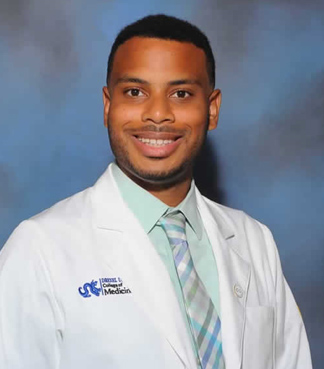
Hometown: College Park, MD
Undergraduate: Johns Hopkins University – BS in Neuroscience and Cellular and Molecular Biology
Graduate: Drexel University – Master of Science in Biomedical Sciences
Can you tell me a little bit about yourself before you came to Drexel?
After graduating from undergrad, I took on a two year position at the Hopkins Hospital to work as a clinical researcher. I wanted to not just expose myself to more clinical opportunities but also take a bit of a break from school to do things I enjoy.
How did your undergraduate experiences prepare you for medical school?
I really had to learn time management and prioritization skills, both in undergrad and as a clinical researcher. I use those skills every day in medical school. For instance, I keep a list of things I want to accomplish for each day and for each week in order to make sure I am prepared for upcoming exams.
How did you hear about the Drexel Pathway to Medical School (DPMS) program? What made you want to apply?
I was searching post-bac programs on the Association of American Medical Colleges’ website and encountered the program. What really pushed me to apply was attending the fall graduate open house where I had the opportunity to meet faculty from the graduate school and College of Medicine. I got the sense that the faculty really cared about the students and wanted them to succeed, and that made me more interested than ever in applying to the program.
What were the DPMS faculty like? What were your relationships with your classmates like?
Everyone on the DPMS faculty is so approachable. They really wanted to help us get into medical school, and definitely went the extra mile to support us and help us learn course material.
My classmates and I were very close, and we all supported each other and helped each other get through the program and into medical school.
Do you feel like DPMS helped prepare you for medical school?
It definitely taught me how to handle an intensive science course load and engage with the material in order to properly retain and apply it. I still use the study skills I learned during DPMS, and they really help me get through the medical school curriculum.
What drew you to medicine?
Growing up, I always knew I was interested in the sciences and that I wanted to use my knowledge to help others. It wasn’t until I volunteered with the Latino community in a Baltimore clinic that I learned that many people need physicians who they can relate to, and who they know will advocate for them. I saw that I could do so much for so many people just by being able to relate to them and help them navigate the complex health care system.
What organizations, extracurriculars, research, or community service experiences have you been involved in at Drexel? How have they impacted your experience here?
I am currently one of the co-presidents for the plastic surgery interest group, on the executive board of the Latino Medical Student Association (LMSA), and this past summer, I did NeuroHIV research through the Department of Immunology and Microbiology. I have met so many great people through these experiences and it really has helped me find a community within the College of Medicine.
What courses or subject areas have you most enjoyed during medical school so far? What are you most looking forward to working on as you continue?
I really enjoyed learning anatomy and going into the anatomy lab to learn how the body is organized and relate that knowledge to different disease processes.
I am looking forward to my clinical years, where I’ll apply everything I have learned and have more patient interactions.
What advice would you give to someone considering DPMS as part of their path to becoming a physician?
There is no right or wrong path to medical school, and the only competition you have is with yourself. Give everything you’ve got, do your best, and remember to make time for the things that you enjoy and that get you through the day.